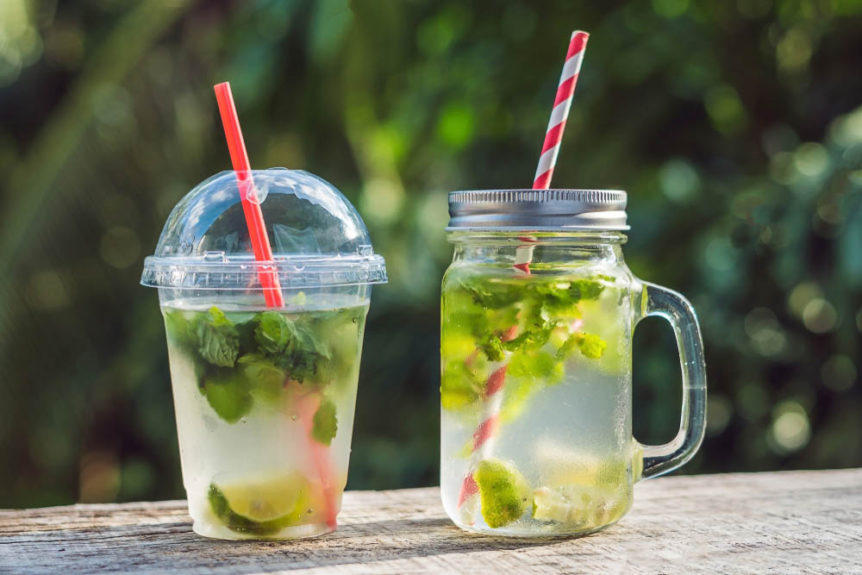Imagine a world where each of us creates only a jar full of garbage each year. It might sound like a farfetched ecological dream, but believe it or not, it is possible now. Living a “zero waste” lifestyle is an idea that’s becoming more and more mainstream, and while some see it simply as a buzzword, there are compelling reasons why we should all be working towards reducing the amount of waste we create.
Aside from the obvious environmental benefit of less landfill waste and plastic pollution, eliminating unnecessary waste from your life can also save you money and encourage healthier choices when buying food.
Of course, not all of us can immediately cut out all the waste in our lives. Realistically, it will take some time to work towards, but if you’re able to make a few small changes and keep some key principles in mind, you really can make a difference:
Avoid waste wherever possible
By far the simplest way to ensure that you aren’t left with waste to dispose of is to avoid buying it in the first place. This might mean thinking hard about new purchases and how you will be able to dispose of them once they’ve outlived their use to you. It might also mean changing where and how you shop, for example by taking your own shopping bags or reusable containers and buying food where it’s available in bulk. If there aren’t any bulk stores around, you could look at buying from your local market. Many cosmetics and cleaning companies are also jumping on the zero waste bandwagon, making it easier than ever to find consumable items for your home that won’t leave waste behind.

Reuse anything that can be reused
You should never throw away items which are still perfectly useable like old clothes, electronics or books that you simply don’t need anymore. As the saying goes, one man’s trash is another man’s treasure. You may be surprised what some people will pay on online auction sites for that second-hand book you didn’t like or that coat that never fit quite right. If you want to help others as well as the environment (or if the admin associated with selling your things just doesn’t appeal to you), you could also donate your items to a charity store or directly to a shelter. Many charities and shelters will have information on their websites about the type of donations they most need. This can also be a fantastic way to get rid of the collection of carrier bags gathering dust in your kitchen cabinet while providing them to others who need them.
Repair rather than replace
It won’t always be straightforward, but try to repair items wherever possible before replacing them. With very basic sewing materials and the aid of an online tutorial, you can have clothes looking new again, and even the cheapest electrical items generally come with a warranty of some kind. If you’re past the end, there will likely be some way of the producer repairing it. While it might mean living without for a couple of days while your item is repaired, you will save yourself the full cost of a new one and prevent the item from going to landfill unless it really needs to.
Recycle everything you can
Much of what we buy can be recycled, one way or another, with relatively little effort, whether it is part of the services provided by your City Council or you need to take your recyclable items to a designated collection point yourself. The list of what can be recycled this way will vary depending on where you are, but in general, this will include glass, paper and cardboard, textiles, some plastics, and a way to compost your food waste. If you have something you know is recyclable, but there is no service in your local area, make a big deal out of it! Write to your city council or state and put pressure on them to provide it. Even if you can’t recycle your item now, your email/letter could make a difference for the future.

Dispose of anything else creatively
The bad news is that even the most fervent eco-warrior will likely still have some waste that can’t be avoided, reused, repaired or recycled – at least unless and until manufacturers use other kinds of packaging for their products. The good news is that by this stage, you’ll have reduced the amount of garbage you have to dispose of by a huge margin and there are still ways that you can turn even that trash into something useful! Wherever you are in the world, look for schemes that will take your trash and turn it into something new and exciting. You could turn plastic bottles stuffed full of unrecyclable plastic into eco bricks (reusable building blocks) that can be used to build indoor furniture, structures in gardens and parks, and even buildings. Your waste might also be perfect for local artists or craftspeople who work with donated garbage to create beautiful new things.

At the end of the day, we can’t be truly be “zero waste” without significant changes to the industries that create consumable goods, but we as individuals can do far more than many people think. Even if each of us is left with a whole trashcan of waste each year, it would be a huge improvement on the ton or more that the average American currently produces. By following these five simple principles and taking it step by step, you can make a big difference to the planet!

